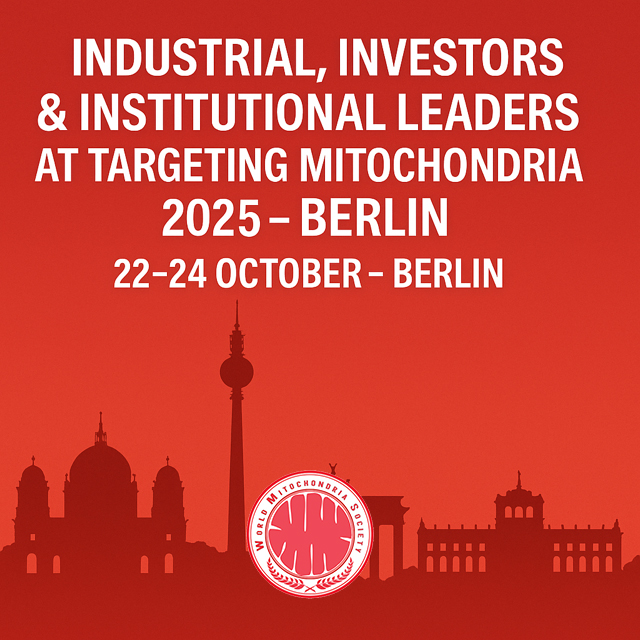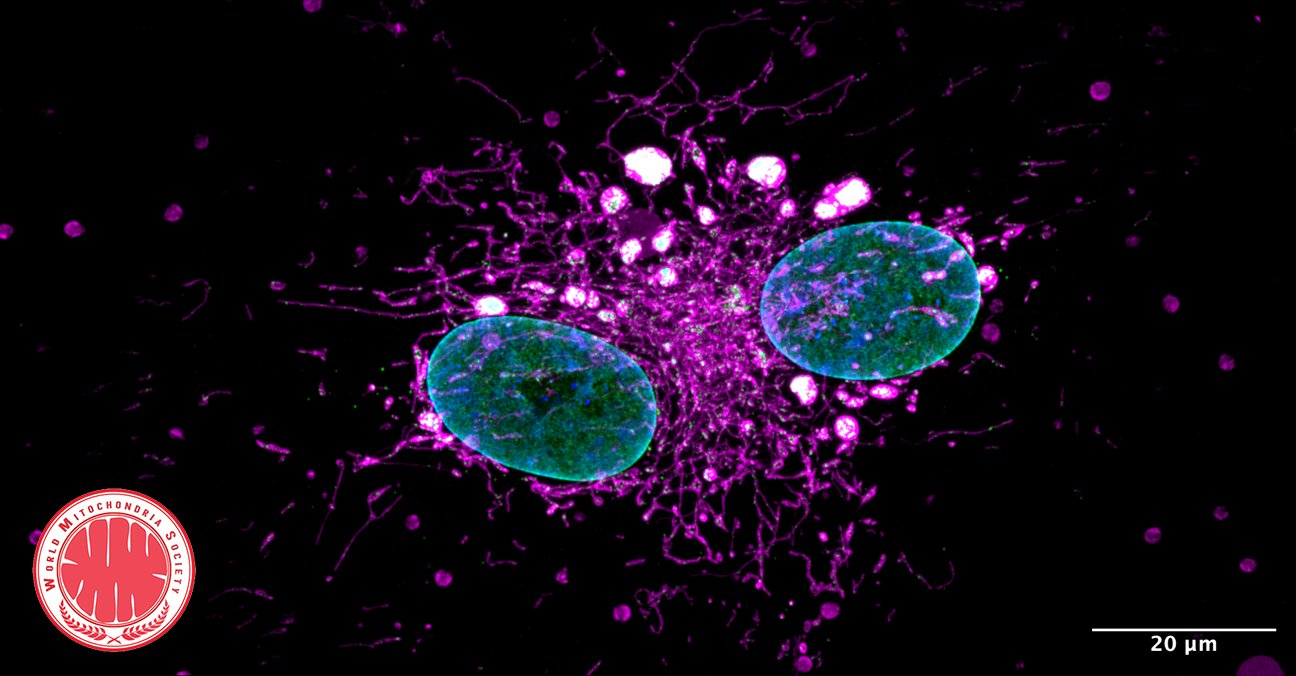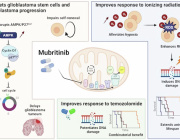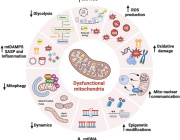Quantifying mitochondrial uptake of nucleobase derivatives through click chemistry
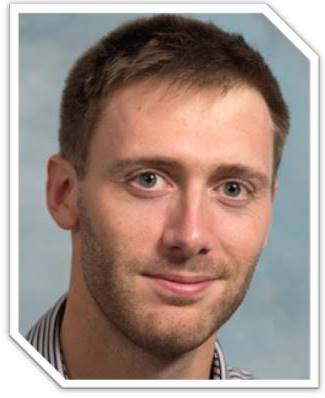 Recently, there has been an increased interest in delivering large molecules to the mitochondrial matrix. However, determining uptake into the mitochondrial matrix is not a straightforward matter. In this talk, Dr. Kurt Hoogewijs from The Wellcome Trust Centre for Mitochondrial Research, Newcastle University, United Kingdom. will describe a novel strategy for the quantification of mitochondrial uptake, based on the quantification of an in situ formed click product.
Recently, there has been an increased interest in delivering large molecules to the mitochondrial matrix. However, determining uptake into the mitochondrial matrix is not a straightforward matter. In this talk, Dr. Kurt Hoogewijs from The Wellcome Trust Centre for Mitochondrial Research, Newcastle University, United Kingdom. will describe a novel strategy for the quantification of mitochondrial uptake, based on the quantification of an in situ formed click product.
This study will be presented during the 8th World Congress on Targeting Mitochondria 2017.
More information: www.targeting-mitochondria.com
Mitochondrial ROS mediated signaling pathways: activation and regulation upon inflammation
 Dr. Andrey V. Kozlov from Ludwig Boltzmann Institute for Experimental and Clinical Traumatology (Vienna, Austria) will talk at the 8th Targeting Mitochondria World congress on “Mitochondrial ROS mediated signaling pathways: activation and regulation upon inflammation”.
Dr. Andrey V. Kozlov from Ludwig Boltzmann Institute for Experimental and Clinical Traumatology (Vienna, Austria) will talk at the 8th Targeting Mitochondria World congress on “Mitochondrial ROS mediated signaling pathways: activation and regulation upon inflammation”.
“In the past, reactive oxygen species (ROS) were considered as side products of cellular metabolism causing oxidative damage to diverse biomolecules and biomembranes. More recently ROS have been discovered as an important component of intracellular signaling cascades. Moreover, recent reports suggest that mitochondrial ROS are the most critical ROS in the activation of specific intracellular signaling cascades. The analysis of diseases associated with inflammation suggests that the activation of mitochondrial ROS mediated signaling cascades can be deleterious causing organ dysfunction.”
More information: www.targeting-mitochondria.com
“The Human Longevity Project - Part 1" will be projected during Targeting Mitochondria World Congress
The Human Longevity Project (Part 1) to be screened at the Targeting Mitochondria 2017 Congress is the world premiere of a groundbreaking, new documentary film series that takes an exciting journey around the globe to study the planet’s healthiest centenarians. This upcoming documentary film opens a new investigation into the four Blue Zones around the world, which have been previously identified by Michel Poulain and National Geographic as places containing an inordinate concentration of people with exceptionally long health-spans and incredible levels of vitality late in life. The Human Longevity Project is an 8-part film series that includes interviews from premier scientists, physicians, healers, & health experts around the globe and gathers together real-world footage and interviews with individuals in the Blue Zones. The intent is to reexamine the daily routines and practices ranging the entire lifespan to determine, from a bioenergetic standpoint, precisely how lifestyle factors affect the aging process and how we can adapt these factors to the presentday world. The series is slated to screen globally in 2018.
For more information: www.targeting-mitochondria.com
Strategic presentation on High-content mitochondrial analysis by live-cell microscopy
 Dr. Werner J.H. Koopman from the Deptartement of Biochemistry, Live-cell Bioenergetics group, Radboudumc, Nijmegen, The Netherlands. will give a talk during the Targeting Mitochondria World congress 2017 which will be held at Steigenberger Hotel, Berlin on October 23-24, 2017 and present his research about "High-content mitochondrial analysis by live-cell microscopy"
Dr. Werner J.H. Koopman from the Deptartement of Biochemistry, Live-cell Bioenergetics group, Radboudumc, Nijmegen, The Netherlands. will give a talk during the Targeting Mitochondria World congress 2017 which will be held at Steigenberger Hotel, Berlin on October 23-24, 2017 and present his research about "High-content mitochondrial analysis by live-cell microscopy"
His research aims to unravel the interconnection between cell metabolism and mitochondrial morphofunction in single living cells during healthy and pathological conditions. Here high-content microscopy tools and their application in research and screening strategies will be presented."
For more information: www.targeting-mitochondria.com/
Development on new technologies for clinical and drug delivery: Probing Mitochondrial Chemical Biology with Organelle-Specific Peptides
 Dr. Shana O'Kelley is a Distinguished Professor of Biochemistry, Pharmaceutical Sciences, Chemistry, and Biomedical Engineering at the University of Toronto, Canada. Dr. Kelley received her Ph.D. from the California Institute of Technology and was a NIH postdoctoral fellow at the Scripps Research Institute. Her research interests are the development of new technologies for clinical diagnostics and drug delivery.
Dr. Shana O'Kelley is a Distinguished Professor of Biochemistry, Pharmaceutical Sciences, Chemistry, and Biomedical Engineering at the University of Toronto, Canada. Dr. Kelley received her Ph.D. from the California Institute of Technology and was a NIH postdoctoral fellow at the Scripps Research Institute. Her research interests are the development of new technologies for clinical diagnostics and drug delivery.
During Targeting Mitochondria World conngress, Dr O'Kelley will present her study on Mitochondria Chemical Biology.
"Mitochondria are very interesting compartments within the eukaryotic cell with a unique evolutionary history. The bacterial origin of mitochondria and retention of a genome differentiate this organelle from others within the cell. Because of the impermeable nature of the mitochondrial membranes, genetic manipulation of the mitochondrial is difficult and as a result little is know about the processes within the organelle that involve nucleic acids. We recently developed a peptide-based delivery vector that can carry reactive cargo into the mitochondria of live mammalian cells. By attaching agents that generate reactive oxygen species or alkylation damage, we can site-specifically probe the cellular response to these insults and deconvolute this response from that resulting from nuclear damage. This approach is revealing new insights into how mitochondrial DNA damage is responded to, and has also indicated that the makeup of mitochondria make them susceptible to other types of bimolecular damage."
More information: www.targeting-mitochondria.com
Studies on mitochondria-targeted plastoquinones and the road from laboratory bench to the market
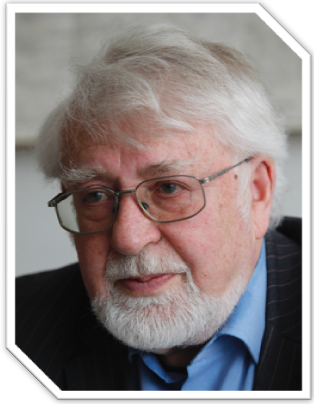 During the 8th World Congress on Targeting Mitochondria 2017, Prof. Vladimir Skulachev from Moscow State University, Moscow, Russia will presentation his studie on mitochondria-targeted plastoquinones and the road from laboratory bench to the market.
During the 8th World Congress on Targeting Mitochondria 2017, Prof. Vladimir Skulachev from Moscow State University, Moscow, Russia will presentation his studie on mitochondria-targeted plastoquinones and the road from laboratory bench to the market.
SkQ1 and other mitochondria-targeted plastoquinone derivatives are promising drug candidates for treatment of pathologies associated with mitochondrial dysfunction. Experiments in animals revealed that SkQ alleviates damage induced by ischemia-reperfusion injury, prevents autoimmune arthritis, suppresses the development of Alzheimer's disease signs, inhibits the development of ophthalmological disorders, including dry eye syndrome (DES), and has anti-inflammatory activity. The first SkQ-based drug (eye drops Visomitin) is already developed and registered in Russia; clinical studies of orally-administered drug is in progress.
During Targeting Mitochondria Congress, Prof. Skulachev will summarize recent experimental data on SkQ effects in animals, results of clinical trials and future perspectives of mitochondria-targeted antioxidants as therapeutic compounds.
More information: www.targeting-mitochondria.com
The WMS organizes a B to B meeting during Targeting Mitochondria Congress to present your innovations
You are working in a university or in a innovative start-up? You have an innovation on mitochondria world to present?
As industrial, you are looking for strategic collaboration with universities/start-up?
Don't hesitate to join the Targeting Mitochondria B to B meeting!
The World Mitochondria Society organize a B to B meeting during Targeting Mitochondria Congress on October 23-24, 2017.
Please contact us if you are interested to take part and we will organize a meeting with the appropriate person during Targeting Mitochondria Congress.
To access the list of attendees, please follow this link.
To register to Targeting Mitochondria2017, please follow this link.
To contact us, please send an email to mitochondria(at)targeting-mitochondria.com
Presentation of novel mechanisms of mitochondrial damage in oxidative death signaling are key targets for neuroprotective strategies
 Prof. Carsten Culmsee from Marburg Center for Mind, Brain and Behavior, Biochemical-Pharmacological Center Marburg at Institute for Pharmacology and Clinical Pharmacy, Faculty of Pharmacy, University of Marburg, Germany will present the novel mechanisms of mitochondrial damage in oxidative death signaling as key targets for neuroprotective strategies. This presentation will be hedl during the 8th edition of Targeting Mitochondria Congress 2017.
Prof. Carsten Culmsee from Marburg Center for Mind, Brain and Behavior, Biochemical-Pharmacological Center Marburg at Institute for Pharmacology and Clinical Pharmacy, Faculty of Pharmacy, University of Marburg, Germany will present the novel mechanisms of mitochondrial damage in oxidative death signaling as key targets for neuroprotective strategies. This presentation will be hedl during the 8th edition of Targeting Mitochondria Congress 2017.
According to Prof. Culmsee, neurodegenerative diseases share hallmarks of detrimental cellular stress such as disruption of neuronal calcium homeostasis and oxidative stress. In Prof. Culmsee's group, they study novel mechanisms of oxidative stress signaling and associated mitochondrial demise as emerging targets for neuroprotective approaches. [...] These findings, which will be described during the congress, provide novel molecular links between oxidative, pathways of regulated necrosis and mitochondrial demise. Thus, therapeutic approaches targeting mitochondria or upstream mechanisms of regulated necrosis hold promising potential for neuroprotective strategies.
For more information: www.targeting-mitochondria.com








